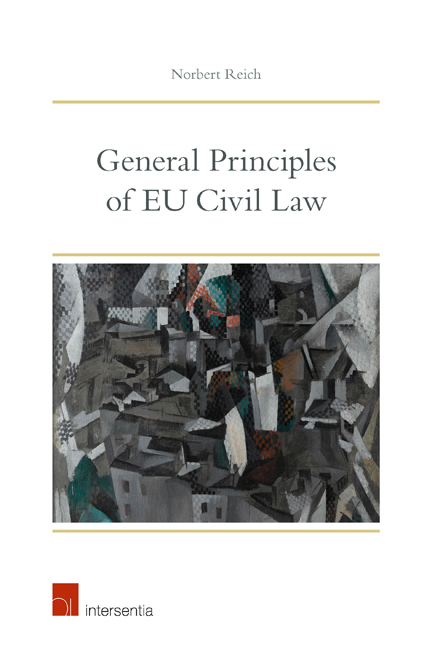Book contents
- Frontmatter
- Preface
- Contents
- Table of ECJ cases: alphabetical
- Table of ECJ cases: chronological
- Table of EU legislation
- List of abbreviations
- Introduction. What are General Principles of EU Civil Law?
- Chapter 1 The Principle of “Framed” Autonomy
- Chapter 2 The Principle of Protection of the Weaker Party
- Chapter 3 The Principle of Non-Discrimination
- Chapter 4 The Principle of Effectiveness
- Chapter 5 The Principle of Balancing
- Chapter 6 The Principle of Proportionality
- Chapter 7 An Emerging Principle of Good Faith and of a Prohibition of Abuse of Rights?
- Summary. Seven Theses and a Conclusion
- Index
Summary. Seven Theses and a Conclusion
Published online by Cambridge University Press: 22 November 2017
- Frontmatter
- Preface
- Contents
- Table of ECJ cases: alphabetical
- Table of ECJ cases: chronological
- Table of EU legislation
- List of abbreviations
- Introduction. What are General Principles of EU Civil Law?
- Chapter 1 The Principle of “Framed” Autonomy
- Chapter 2 The Principle of Protection of the Weaker Party
- Chapter 3 The Principle of Non-Discrimination
- Chapter 4 The Principle of Effectiveness
- Chapter 5 The Principle of Balancing
- Chapter 6 The Principle of Proportionality
- Chapter 7 An Emerging Principle of Good Faith and of a Prohibition of Abuse of Rights?
- Summary. Seven Theses and a Conclusion
- Index
Summary
EU general civil law principles as understood in this study owe their origin both to the acquis communautaire and its link with the rights and principles contained in the Charter of Fundamental Rights, and to earlier documents of constitutional relevance of the EU. Their legitimacy can be found in Article 19(1) TEU, whereby the ECJ must “ensure that in the application the interpretation of the Treaties the law is observed” (Introduction).
Three of these general principles are substantive in nature (“framed autonomy”, protection of the weaker party, and non-discrimination: Chapters 1 to 3), one remedial (effectiveness: Chapter 4), and two methodological (balancing and proportionality: Chapters 5 and 6). A “half” principle of “good faith” is just emerging but is so far rather narrow in scope (Chapter 7).
The first and foremost function of these general principles is one of interpreting the acquis. This task is conferred on the ECJ mostly within the framework of reference proceedings (Article 267 TFEU), as the many examples in Chapters 1 to 3 of this study have demonstrated. Member State courts at whatever level of the judicial hierarchy participate in this process. Conflicts between the substantive principles must be settled by a balancing approach (Chapter 5). An individualistic Vorverständnis (pre-understanding) of the ECJ can be seen to exist.
The second, more contested gap-filling function of general principles relates mostly to the three facets of the effectiveness principle, namely eliminatory, hermeneutical and remedial. This function must be coordinated with the so-called procedural autonomy of Member States which may result in a “hybridisation of remedies”, for example in an ex officio control of unfair terms, or in creating a remedy of compensation for serious violations of Union-granted citizen rights.
Legality of EU action (as well as “implementing” Member State law in a broad sense) is monitored mainly by recourse to the proportionality principle (Chapter 6), as set out in the controversial Test-Achats judgment referring to the “coherence” criteria. This works against attempts to create some kind of comprehensive EU contract or sales law, even in the form of an optional instrument like the CESL.
- Type
- Chapter
- Information
- General Principles of EU Civil Law , pp. 213 - 214Publisher: IntersentiaPrint publication year: 2013



